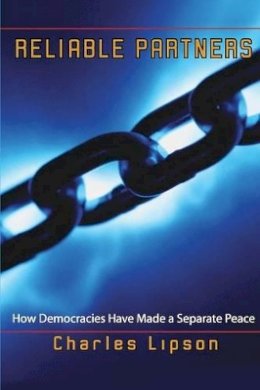
Stock image for illustration purposes only - book cover, edition or condition may vary.
Reliable Partners: How Democracies Have Made a Separate Peace
Charles Lipson
€ 65.25
FREE Delivery in Ireland
Description for Reliable Partners: How Democracies Have Made a Separate Peace
Paperback. Why do democracies avoid fighting each other? This book examines research and speculation on the subject and tests this against the history of relations between democracies over two centuries. It concludes that constitutional democracies have a 'contracting advantage' - a unique ability to settle conflicts with each other by durable agreements. Num Pages: 272 pages, 2 line illus. 4 tables. BIC Classification: JPHV. Category: (P) Professional & Vocational; (U) Tertiary Education (US: College). Dimension: 159 x 236 x 16. Weight in Grams: 394.
Democracies often go to war but almost never against each other. Indeed, "the democratic peace" has become a catchphrase among scholars and even U.S. Presidents. But why do democracies avoid fighting each other? Reliable Partners offers the first systematic and definitive explanation. Examining decades of research and speculation on the subject and testing this against the history of relations between democracies over the last two centuries, Charles Lipson concludes that constitutional democracies have a "contracting advantage"--a unique ability to settle conflicts with each other by durable agreements. In so doing he forcefully counters realist claims that a regime's character is irrelevant to war and peace. Lipson argues that because democracies are confident their bargains will stick, they can negotiate effective settlements with each other rather than incur the great costs of war. Why are democracies more reliable partners? Because their politics are uniquely open to outside scrutiny and facilitate long-term commitments. They cannot easily bluff, deceive, or launch surprise attacks. While this transparency weakens their bargaining position, it also makes their promises more credible--and more durable, for democracies are generally stable. Their leaders are constrained by constitutional rules, independent officials, and the political costs of abandoning public commitments. All this allows for solid bargains between democracies. When democracies contemplate breaking their agreements, their open debate gives partners advance notice and a chance to protect themselves. Hence agreements among democracies are less risky than those with nondemocratic states. Setting rigorous analysis in friendly, vigorous prose, Reliable Partners resolves longstanding questions about the democratic peace and highlights important new findings about democracies in world politics, from rivalries to alliances. Above all, it shows conclusively that democracies are uniquely adapted to seal enduring bargains with each other and thus avoid the blight of war.
Product Details
Format
Paperback
Publication date
2005
Publisher
Princeton University Press United States
Number of pages
272
Condition
New
Number of Pages
272
Place of Publication
New Jersey, United States
ISBN
9780691122779
SKU
V9780691122779
Shipping Time
Usually ships in 7 to 11 working days
Ref
99-1
About Charles Lipson
Charles Lipson is Professor of Political Science at the University of Chicago, where he founded and codirects PIPES, the Program on International Politics, Economics, and Security. He is the author of "Standing Guard: Protecting Foreign Capital in the Nineteenth and Twentieth Centuries".
Reviews for Reliable Partners: How Democracies Have Made a Separate Peace
"[I]mportant and engagingly written... If you want a book that takes theory seriously yet will engage students on fundamental aspects of international politics, this is one on a short shelf."
Bruce Russett, Perspectives on Politics
Bruce Russett, Perspectives on Politics
